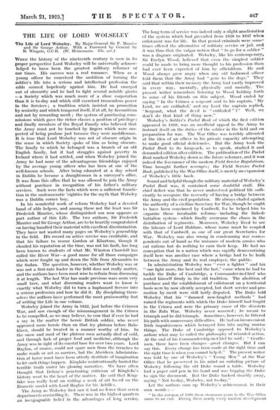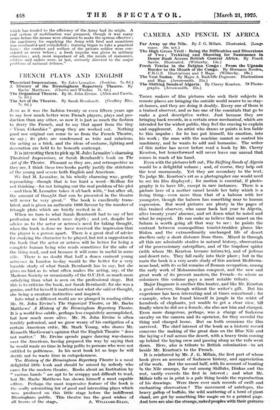THE LIFE OF LORD WOLSELEY
The Life of Lord Wolseley. By Major-General Sir F. Maurice and Sir George Arthur. With a Foreword by General Sir R. Wingate, G.C.B. (W. Heinemann. 25s. not.) WREN the history of the nineteenth century is seen in its proper perspective Lord Wolseley will be universally acknow- ledged to have been the greatest military reformer of our times. His success was a real romance. When as a young officer he conceived the ambition of turning the soldier's life into a serious and intellectual profession the odds seemed hopelessly against him. He had emerged out of obscurity and he had to fight several notable giants —a. Society which was much more of a close corporation than it is to-day and which still exercised tremendous power in the Services ; a tradition which insisted on promotion by seniority and which tempered itself, if at all, by favouritism and not by rewarding merit ; the system of purchasing com- missions which gave the richer classes a position of privilege ; and fmally members of the Royal Family who believed that the Army must not be touched by fingers which were sus- pected of being profane just because they were meddlesome. It is true that Lord Wolseley was not of obscure origin in the sense in which Society spoke of him as being obscure. The family to which he belonged was a branch of an old English family, but it had struggles against poverty in Ireland where it had settled, and when Wolseley joined the Army he had none of the advantageous friendships enjoyed by the average young officer who has been at one of the well-known schools. After being educated at a day school in Dublin he became a draughtsman in a surveyor's office. It was from this office that he was allowed to join the Army without purchase in recognition of his father's military services. Such were the facts which were a sufficient founda- tion in the undemocratic 'eighties for the myth that Wolseley was a Dublin corner boy.
In his wonderful work of reform Wolseley had a devoted band of able helpers, and among these not the least was Sir Frederick Maurice, whose distinguished son now appears as part author of this Life. The two arithors, Sir Frederick Maurice and Sir George Arthur, are to be heartily congratulated on having handled their material with excellent discrimination. They have not wasted many pages on Wolseley's generalship iri the field. His record on active service was creditable, and that his failure to rescue Gordon at Khartum, though it clouded his reputation at the time, was not his fault, has long been known to students of what Mr. Winston Churchill has called the River War—a good name for all those campaigns which were fought up and down the Nile from Alexandria to the Sudan. The question, however, whether Wolseley was or was not a first-rate leader in the field does not really matter, and the authors have been most wise to refrain from discussing it at length. The last War has made previous wars seem very small beer, and what discerning readers want to know is exactly what Wolseley did to turn a haphazard Service into a serious profession and how he did it. By disciplining them- selves the authors have performed the most praiseworthy feat of writing the Life in one volume.
Wolseley joined the Army in 1852, just before the Crimean War, and saw enough of the mismanagement in the Crimea to be compelled, as we may believe, to vow that if ever he had a say in the matter the heroic British soldier, who never appeared more heroic than on that icy plateau before Bala- klava, should be treated in a manner worthy of him. In the snow and mud of the plateau men actually died of cold, and through lack of proper food and medicine, although the Army was in sight of its coastal base for over two years. Lord Raglan, of course, could not spare men from the trenches to make roads or act as carriers, but the Aberdeen Administra- tion at home must have been utterly destitute of imagination to let such things happen. Kinglake unintentionally buried the terrible truth under his glowing narrative. We have often thought that Delane's penetrating criticism of Kinglake's history went to the heart of the matter. He said that King- lake was really bent on writing a work of art bated on the Homeric model with Lord Raglan for his Achilles.
The Army as Wolseley first saw it had no fewer than seven departments controlling it. There was in the highest quarters an inexpiignablc belief in the advantages of long service.
The long term of service was indeed only a slight amelioration of the system which had prevailed from 1826 to 1847 when enlistment was for life. In that period criminals were some- times offered the alternative of military service or jail, and it was thus that the vulgar notion that to go for a soldier" was a disgrace originated. Wolseley, like his contemporary, Sir Evelyn Wood, believed that even the simplest soldier could be made to bring more thought to his profession than had ever been expected of him by officialdom. He and Wood always grew angry when any old fashioned officer told them that the Army had " gone to the dogs." They said that within their memory the Army had vastly improved in every way, mentally, physically and morally. The present writer remembers listening to Wood holding forth to some of his friends on this subject. Wood ended by saying " In the Crimea a sergeant said to his captain, ' My Lord, we are enfiladed,' and my Lord the captain replied, Sergeant, what the devil is " enfiladed " Y ' Well, we don't do that kind of thing now."
Wolseley's Soldier's Pocket Book of which the first edition appeared in 1869, was an unofficial appeal to the Army to instruct itself on the duties of the soldier in the field and on preparation for war. The War Office was terribly affronted at the idea of an officer in his private capacity attempting to make good official deficiencies. But the Army took the Pocket Book to its knapsack, so to speak, studied it and demanded edition after edition. Time publication of the Pocket Book marked Wolseley down as the future reformer, and it was indeed the forerunner of the modern Field Service Regulations. Time brought further revenges ; the Field Service Pocket Book, published by the War Office itself, is merely an expansion of Wolscley's little book.
Sound and helpful though the military material of Wolseley's Pocket Book was, it contained some doubtful stuff. His chief defect was that he never understood political life suffi- ciently to recognize the necessity of having a bridge between the Army and the civil population. He always chafed against the authority of a civilian Secretary for War, though he ought to have been convinced by Cardwell, for he helped him to organize those invaluable reforms—including the linked- battalion system—which finally overcame the chaos in the distribution of regiments. Moreover, Wolseley lived to see the labours of Lord Haldane, whose name must be coupled with that of Cardwell, as one of our great Secretaries for War. Wolseley was also wrong in condemning war corres- pondents out of hand as the nuisance of modern armies who eat rations but do nothing to earn their keep. He had no conception that in a nation which was rapidly democratizing itself here was another case where a bridge had to be built between the Army and its real employer, the public.
In administration Wolseley was " ever a fighter " and his " one fight more, the best and the last," came when he had to tackle the Duke of Cambridge, a Commander-in-Chief who rooted himself firmly in the old tradition. The abolition of purchase and the establishment of enlistment on a territorial basis were by now silently accepted, but short service and pro- motion by merit were still hotly disputed. The Duke told Wolseley that his " damned new-fangled methods " had ruined the regiments with which the Duke himself had fought in the Crirriea and were the primary cause of the disasters in the Zulu War. Wolseley never wavered ; lie meant to triumph and he did triumph. Sometimes, however, he littered his path with unnecessary difficulties. He had an inconvenient Irish impulsiveness which betrayed him into saying unwise things. The Duke of Cambridge opposed to 1Volseley's ardour what may be called the philosophy of retarded action. At the end of his Commandership-in-Chief he said : " Gentle- men, there have been changes—great changes. But I can say this. Every change has been made at the right time and the right time is when you cannot help it." The present writer was told by one of Wolseley's " Young Men " at the War Office that lie preserved in his mind an unfading picture of Wolseley following the old Duke round a table. Wolseley had a paper and pen in his hand and was begging the Duke to sign the document. But the Duke backed steadily away, saying " Not to-day, Wolseley, not to-day."
Let the authors sum up Wolseley's achievement in their own words
" In the autumn of 1890 these strenuous years in the War Office came to an end. During them nearly every modern developinent which has tended to the efficiency of the Army had its origin. A real system of mobilisation was prepared, though it was many years before the means were obtained to make the system effective ; the machinery for supplying the Army with food and munitions was overhauled and remodelled ; training began to take a practical form ; the comfort and welfare of the private soldier were con- sidered as never before ; a fresh impulse was given to military education ; and, most important of all, the minds of statesmen, soldiers and sailors were, at last, seriously directed to the major problems of national defence."























































 Previous page
Previous page